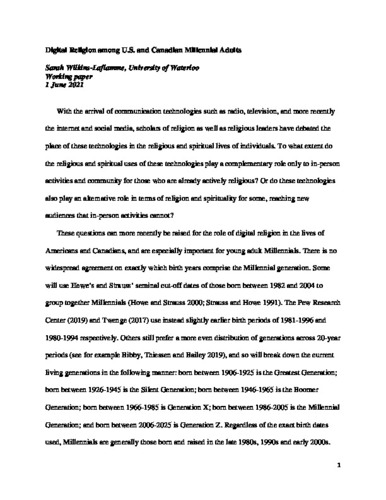| dc.contributor.author | Wilkins-Laflamme, Sarah | |
| dc.date.accessioned | 2023-03-21 18:31:40 (GMT) | |
| dc.date.available | 2023-03-21 18:31:40 (GMT) | |
| dc.date.issued | 2022-06 | |
| dc.identifier.uri | https://doi.org/10.1007/s13644-021-00463-0 | |
| dc.identifier.uri | http://hdl.handle.net/10012/19217 | |
| dc.description | This is a post-peer-review, pre-copyedit version of an article published in Review of Religious Research. The final authenticated version is available online at: https://doi.org/10.1007/s13644-021-00463-0 | en |
| dc.description.abstract | Background
Although there is a growing body of research on the nature and content of digital religion, we still know little about the prevalence of digital religious and spiritual practices among different populations in North America. To what extent do digital technologies play a complementary role to in-person religious and spiritual activities only, or do they also reach out to and provide important spaces for new segments of the population removed from more conventional forms of organized religion?
Purpose
The goal is to answer this research question and to explore the prevalence of different types of digital religion practices specifically among young adult Millennials in both the U.S. and Canada. Three contrasting hypotheses are tested: that digital religion practices are prevalent among large segments of the Millennial population and are part of a wider turn towards individual spiritualization (H1); that digital religion practices are another set of religiosity indicators showing signs of a secular transition among Millennials (H2); or that both trends are occurring in tandem, in that some Millennials are practising digital religion, mostly but not exclusively tied to in-person religious activities and socialization (H3).
Methods
To test these hypotheses, we generate a series of descriptive and logit regression statistical analyses using novel and high-quality 2019 Millennial Trends Survey data from both Canada and the U.S.
Results
We find that 1) digital religion as measured in this study is a phenomenon present among many Millennials, although it is also not present among all or a vast majority of this demographic; 2) this is especially the case for more passive forms of digital religion, notably digital content consumption, compared with more active forms such as social media posting; 3) social environment does play an important role, with digital religion practices much more prevalent in the generally more religious U.S. context, compared with the generally more secular Canadian context; and 4) digital religion practices are often, but not always, tied to other in-person religious and spiritual activities among Millennials.
Conclusions and Implications
We find support especially for our third hypothesis (H3) with these results. Consequently, we argue that we should understand the individual spiritualization and secular transition frameworks as complementary, rather than in complete opposition, regarding the prevalence of digital religion among Millennials. | en |
| dc.description.sponsorship | SSHRC Insight Development Grant. Surveying Millennials’ Non-Religious Homophily and Social Distance. | en |
| dc.language.iso | en | en |
| dc.publisher | Springer | en |
| dc.relation.ispartofseries | Review of Religious Research; | |
| dc.subject | digital | en |
| dc.subject | religion | en |
| dc.subject | spiritual | en |
| dc.subject | millennials | en |
| dc.subject | social media | en |
| dc.subject | young adults | en |
| dc.title | Digital Religion Among U.S. and Canadian Millennial Adults | en |
| dc.type | Article | en |
| dcterms.bibliographicCitation | Wilkins-Laflamme, S. (2022). "Digital Religion Among US and Canadian Millennial Adults." Review of Religious Research 64(2): 225-248. | en |
| uws.contributor.affiliation1 | Faculty of Arts | en |
| uws.contributor.affiliation2 | Sociology and Legal Studies | en |
| uws.typeOfResource | Text | en |
| uws.peerReviewStatus | Reviewed | en |
| uws.scholarLevel | Faculty | en |

